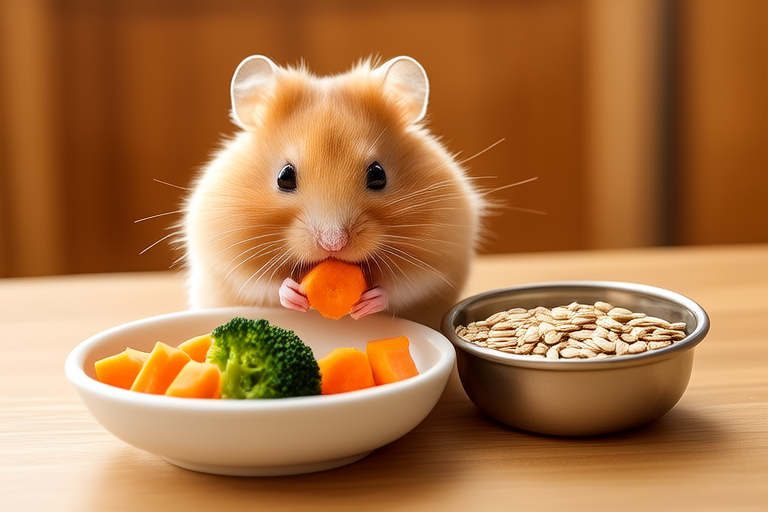Hamster Diets Decoded: What Treats Are Actually Good for Them?
Welcome to the fascinating world of hamster diets! Ensuring your furry friend has a balanced diet is crucial for their overall health and well-being. A proper diet can prevent various health issues and ensure they live a long, happy life. In this article, we will decode the essentials of a hamster’s diet, discuss the core components, dispel common misconceptions, and provide a comprehensive list of beneficial treats.
The Importance of a Balanced Diet
A balanced diet for hamsters involves a combination of nutrients that support their energy levels, growth, and immune system. Like all pets, hamsters need a mix of proteins, fats, carbohydrates, vitamins, and minerals. A healthy diet ensures they have the strength to explore their environment, play, and socialize. It also helps them maintain a healthy weight, preventing obesity-related diseases.
Core Components of a Hamster’s Diet
Pellets
Pellets form the foundation of a hamster’s diet. They are specifically formulated to meet the nutritional requirements of these small rodents. High-quality pellets contain essential vitamins and minerals, making them an excellent choice for daily feeding. Ensure you choose a pellet brand that is free from artificial additives and preservatives.
Fresh Vegetables
Vegetables provide vital nutrients like fiber, vitamins, and minerals. Dark leafy greens, such as spinach and kale, are excellent choices. Other suitable vegetables include carrots, bell peppers, and cucumbers. Always introduce new vegetables gradually to monitor any adverse reactions.
Fruits
Fruits offer natural sugars and additional vitamins. However, due to their high sugar content, they should be fed sparingly. Apples, strawberries, and blueberries are good options. Remember to remove seeds and pits, which can be harmful.
Misconceptions About Human Foods
Many pet owners mistakenly believe that sharing their table scraps is a kind gesture towards their hamsters. However, many human foods can be dangerous or unhealthy for these small animals. For instance, chocolate, caffeine, and alcohol are toxic. Avocados and raw beans contain compounds that can cause digestive distress. Always research before introducing new foods to your hamster’s diet.
Beneficial Treats for Hamsters
Vegetables
- Spinach: Rich in iron and vitamin K, spinach promotes strong bones and blood health. Offer 1-2 leaves per week.
- Kale: High in calcium and antioxidants, kale supports bone density and eye health. Provide 1-2 leaves weekly.
- Carrots: Carrots are a great source of beta-carotene, which converts to vitamin A in the body. Limit to one small piece twice a week.
- Bell Peppers: These are rich in vitamin C, which boosts the immune system. Feed small pieces 1-2 times a week.
Fruits
- Apples: Apples provide essential vitamins and fiber. Remove seeds and feed a small slice once a week.
- Strawberries: Strawberries are rich in vitamin C and antioxidants. Offer 1-2 berries twice a week.
- Blueberries: Blueberries are packed with antioxidants and are a delightful treat. Provide 1-2 berries once a week.
Commercial Treats
- Seed Mixes: Seed mixes offer a variety of nutrients but can be high in fat. Feed a small spoonful once a week.
- Dried Fruits: Dried fruits, like raisins and cranberries, provide concentrated nutrition. Limit to a few pieces per week.
- Treat Sticks: Commercial treat sticks often contain a mix of seeds, nuts, and dried fruits. Use as directed on the package.
Risks of Overfeeding or Feeding Inappropriate Foods
Overfeeding can lead to obesity, diabetes, and other health issues. Additionally, certain foods can cause digestive problems or poisoning. Always follow recommended serving sizes and avoid feeding foods that are toxic to hamsters.
Tips for Rotating Treats
Rotating treats helps maintain variety and ensures a balanced diet. Introduce new treats gradually and monitor your hamster’s reaction. Rotate between different types of vegetables, fruits, and commercial treats to keep their diet interesting and nutritious.
In conclusion, understanding the dietary needs of your hamster is key to their health and happiness. By providing a balanced diet and carefully selecting treats, you can ensure your hamster enjoys a long and vibrant life. Always consult with a veterinarian if you have concerns about your hamster’s diet or health.
